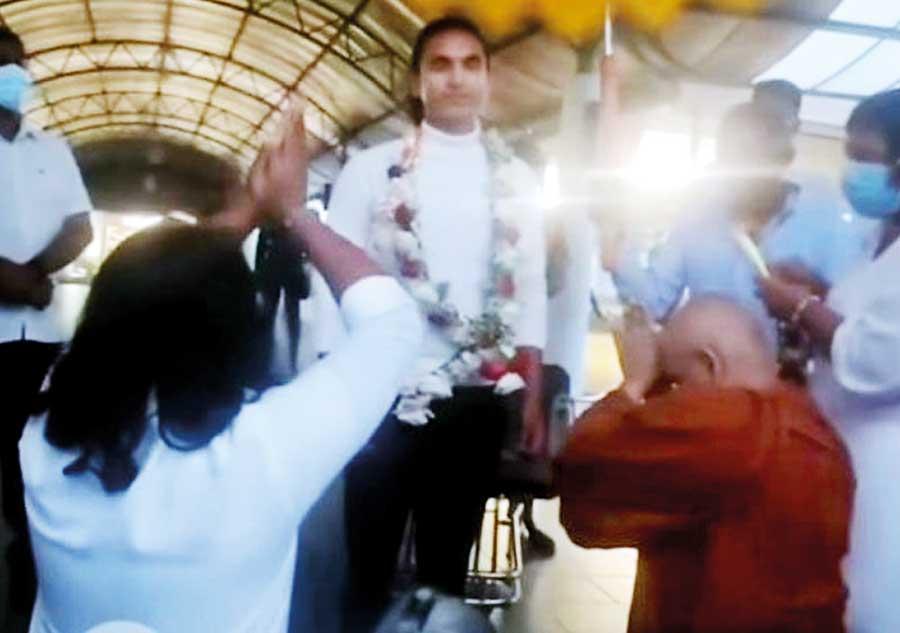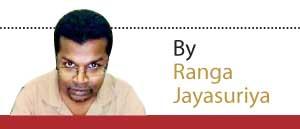17 Jan 2024 - {{hitsCtrl.values.hits}}

Viral social media videos showed the man – who had recently arrived from Egypt where he was said to be a dog-walker – being worshipped by the devotees, including a Buddhist nun when he visited the Kelaniya temple.
New laws, as demanded by the monks, are an erroneous and dangerous idea. Much of the civilized world is becoming less religious and more respectful of Fundamental Rights, including Religious Freedom and the Freedom of Expression. One cannot be promoted at the expense of the other. Contemporary history of religion would reveal that religion, guarded with paranoid zeal at the expense of Fundamental Rights, would breed its own monsters, which would cannibalize not just the faithful but the whole society.
Police have arrested a self-styled god-man, who claims to be Avalokiteshvara Bodhisattva, a Buddha in waiting, after the Buddhist clergy complained that his sermons had distorted Buddhism.
after the Buddhist clergy complained that his sermons had distorted Buddhism.
Viral social media videos showed the man – who had recently arrived from Egypt where he was said to be a dog-walker – being worshipped by the devotees, including a Buddhist nun when he visited the Kelaniya temple.
The suspect, identified as Mahinda Kodithuwakku, was arrested under Sections 291 (a) and 291 (b) of the Penal Code for allegedly advocating ‘with the explicit intent of causing religious offence and insulting the religion or beliefs of a certain group’, and under the Money Laundering Act.
Earlier, Colombo Fort Magistrate, Thilina Gamage directed the Central Bank to submit a report on bank accounts maintained by Kodithuwakku, and imposed an overseas travel ban on the suspect.
The latest incident comes in the wake of the recent appearance of several self-styled prophets who claim to offer solutions to earthly problems and otherworldly salvation.
Two weeks ago, mass suicides involving followers of a death cult led by another self-styled preacher shocked the country. The main culprit, Ruwan Prasanna Gunaratne, a former chemist, had encouraged his disciples to commit suicide to fast-track the end of Sansara (the continued cycle of life), and had distributed packets of a poisonous substance similar to Cyanide.
Police launched an investigation only after the suicide of the suspect, which was followed by a mass suicide of his wife and children and several followers. Seven suicides have been recorded related to the cult.
In another incident, a Christian pastor, Jerome Fernando, senior overseer of The Glorious Church in Colombo, was arrested over charges of insulting other religions. He is accused of disparaging Buddhism and Islam in his in-house sermons and is charged under the International Covenant on Civic and Political Rights Act.
Most self-styled prophets seem to be keener on earthly rewards than otherworldly affairs. Like the rest of his disgraced counterparts, Pastor Jerome is investigated under the Anti-Money Laundering Act and is unable to account for millions of funds deposited in his bank accounts.
Buddhism is generally insulated from fake prophets, though not from bogus miracle makers. However, the emergence of Buddhist prophets may suggest that too much religiosity among some pious Buddhist groups has gone awry. The commercialization of Buddhism may add to that crisis.
Self-Styled Fake Prophets: Religiosity Gone Awry
The rise of the new band of religious conmen may align with a similarly perverted global trend. Kenya Police are still digging a jungle compound of a Christian sect of which the leader had led his followers to starve to death to ‘meet their Creator’. Over 70 bodies have been exhumed from the site so far.
A recent BBC investigation alleged Nigerian pastor, T. B. Joshua had raped hundreds of his followers during his lifetime.
Evangelical Christianity, popular in Africa, is known for self-proclaimed prophets and other varieties of con artists, a predatory breed that exploits the poverty-stricken congregation.
Buddhism is generally insulated from fake prophets, though not from bogus miracle makers. Remember the monk in Dolakanda who allegedly turned an entire reservoir into ‘holy water’?
However, the emergence of Buddhist prophets may suggest that too much religiosity among some pious Buddhist groups has gone awry.
This may also result from an enhanced existential identity crisis, in some cases aggravated by the financial crisis – though some of the most devoted followers of Pastor Jerome surely have deep pockets.
The commercialization of Buddhism may add to that crisis.
The Chief Prelates, the Mahanayakas, in a letter to the President, sought legal action against those who defame Buddhism. In a joint letter, the prelates have demanded the formulation of legal provisions to prevent the recurring distortion of Buddhist principles, referred to as ‘Dharma distortions’ and ‘Sasana distortions.
Sadly though, commonsense, rationale and proactive advocacy to defend religious rights and push back against distortions are in short supply. Instead, the standard course of action is selective outrage, guided by paranoia and petty intolerance. Selective outrage does not help either – worse still when the governments in power, politicians and their acolytes co-opt certain perversions while crying wolf over the others.
The Medieval Way: Religion at the Expense of other Freedoms
New laws, as demanded by the monks, are an erroneous and dangerous idea.
Much of the civilized world is becoming less religious and more respectful of Fundamental Rights, including Religious Freedom and the Freedom of Expression. One cannot be promoted at the expense of the other.
Existing legal provisions of the International Covenant of Civil and Political Rights provide enough remit to address the concerns raised in the prelates’ missive, instead of calls for new laws for the smack of paranoia, insularity and dogmatism.
During its early years of independence, Sri Lanka put up with the opposition from Buddhist devotees and still refused to censure Martine Wickremesinghe’s controversial book on The Buddha, ‘Bhavatharanaya,’ only to relent decades later to placate local Muslim leaders to ban Salman Rushdie’s “The Satanic Verses”.
Selective outrage does not help either – worse still when the governments in power, politicians and their acolytes co-opt certain perversions while crying wolf over the others.
Where would the cobra that as claimed by some monks of Kelaniya Viharaya, emerge from the depth of the Kelani river, carrying with it Buddhist relics on the eve of Gotabaya Rajapaksa’s Presidential victory, fit in this discourse?
Where would the Dolakanda monk who claimed to perform miracles and his congregation that caused a public health hazard, fit in?
Where would Dammika Peniya, the infamous anti-COVID tonic co-opted by the Gotabaya Rajapaksa administration, fit in?
High priests were strangely silent in the face of such state-sanctioned manipulations. A call for caution might have gone a long way in shielding the faithful from these commonplace scams.
Sadly though, commonsense, rationale and proactive advocacy to defend religious rights and push back against distortions are in short supply. Instead, the standard course of action is selective outrage, guided by paranoia and petty intolerance (not the strength of tolerance that Buddhism advocates). Buddhism should not be a mirror image of intolerance of the other. Religious leaders or politicians who seek to import lessons of religious control from elsewhere do not take us to the future; rather they drag us to the past.
This brings us to the final point. Recently, while self-style conmen were making a killing and duping their followers, only to find fault with the system when they talked trash on Buddhism, the law enforcement agencies were more at ease in arresting poets, YouTube commentators and a standup comedian for allegedly insulting religion – and on two separate incidents, over advocating for extremism. Such witch-hunts do not make a religion secure.
Contemporary history of religion would reveal that religion, guarded with paranoid zeal at the expense of Fundamental Rights, would breed its own monsters, which would cannibalize not just the faithful but the whole society.
Whereas the comedian’s job is to lampoon, a society without poets would be as miserable as one with too much religion.
Follow @Ranga Jayasuriya on Twitter
04 Jan 2025 1 hours ago
04 Jan 2025 1 hours ago
04 Jan 2025 1 hours ago
04 Jan 2025 2 hours ago
04 Jan 2025 8 hours ago